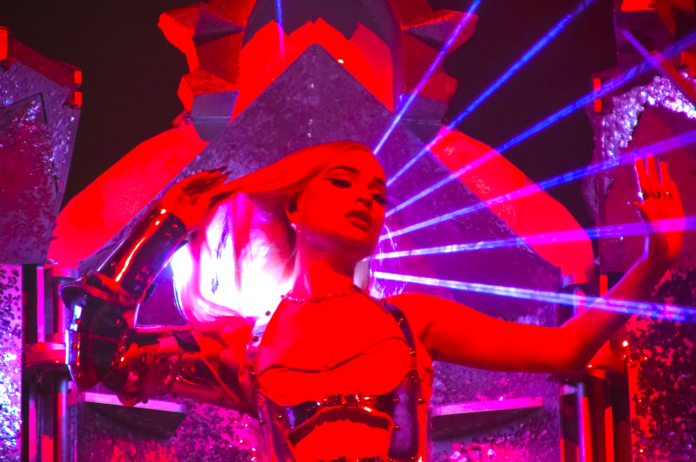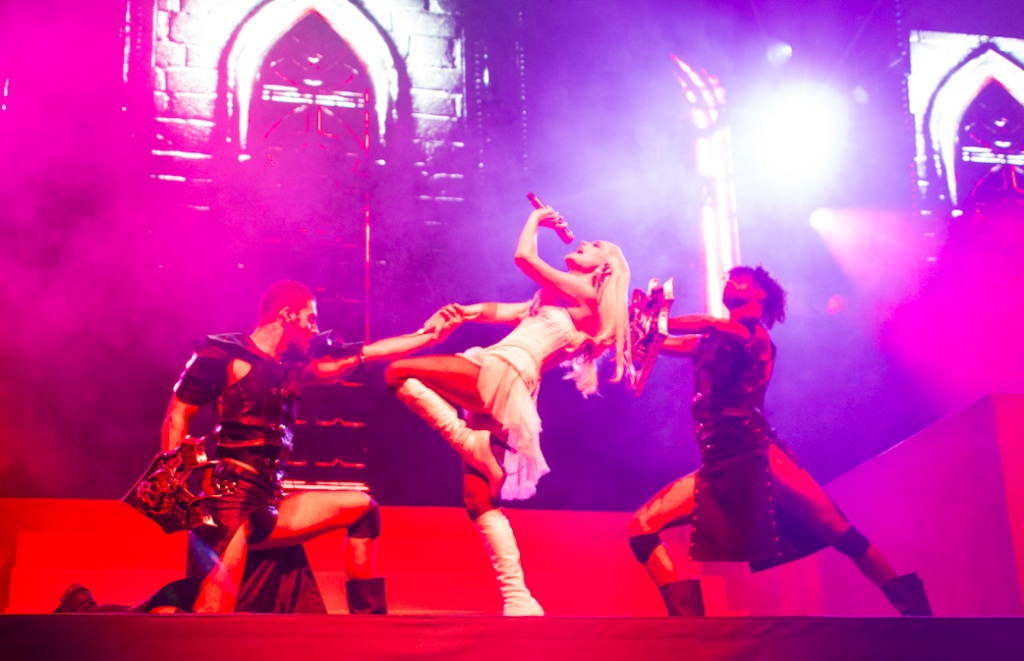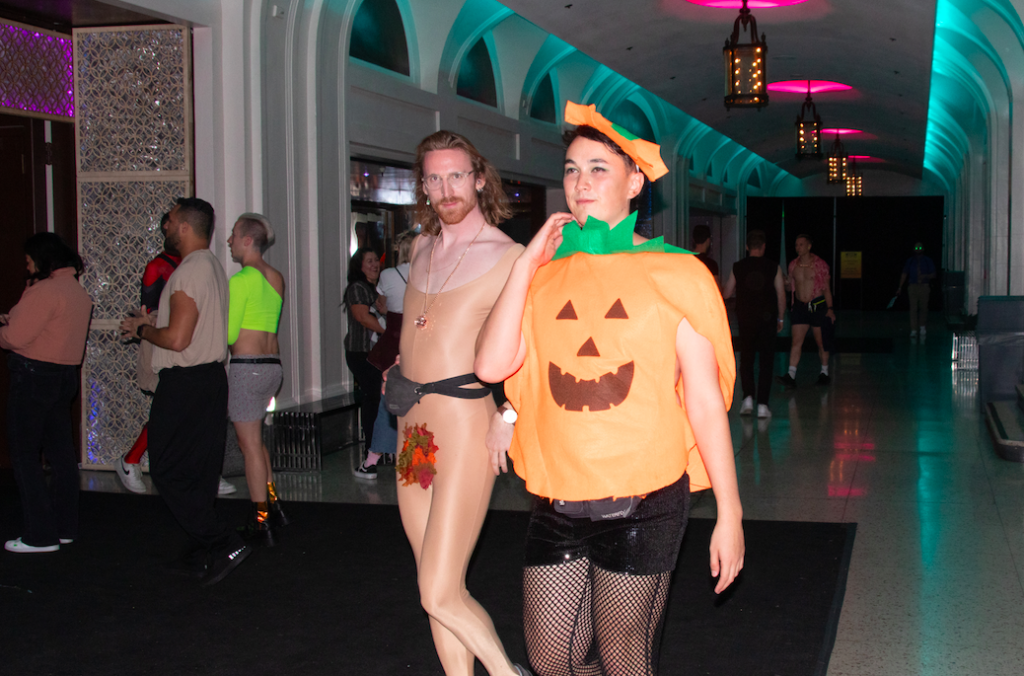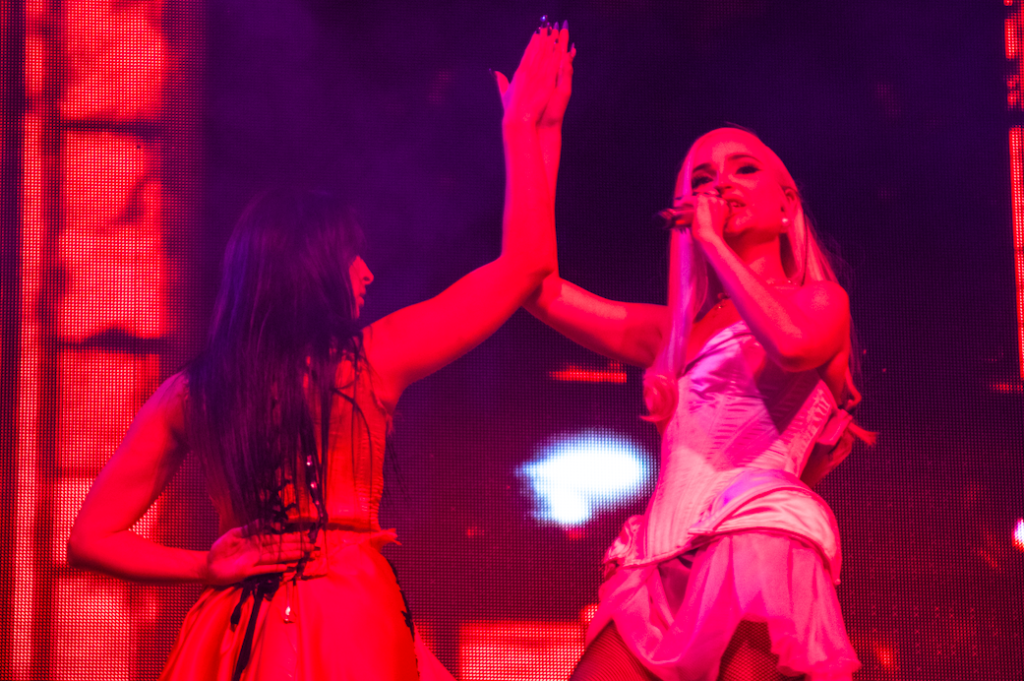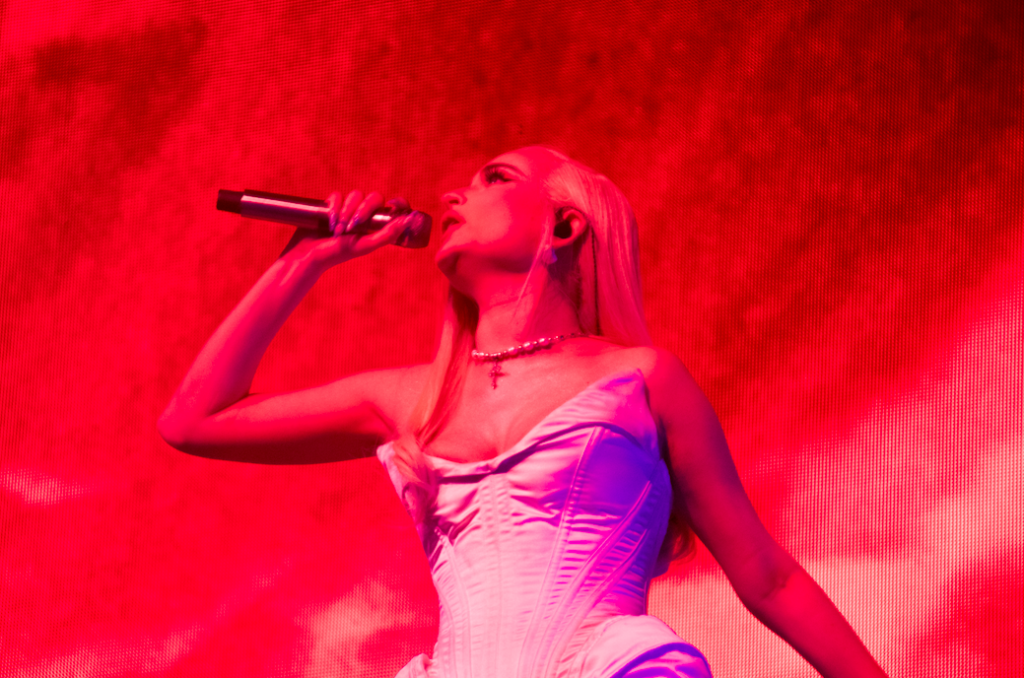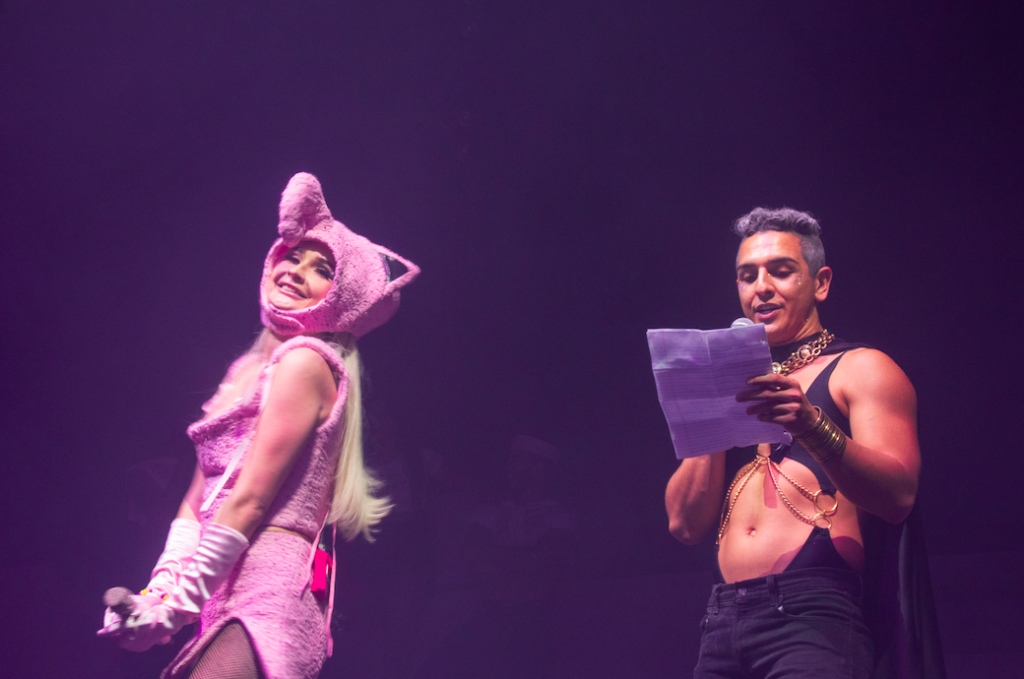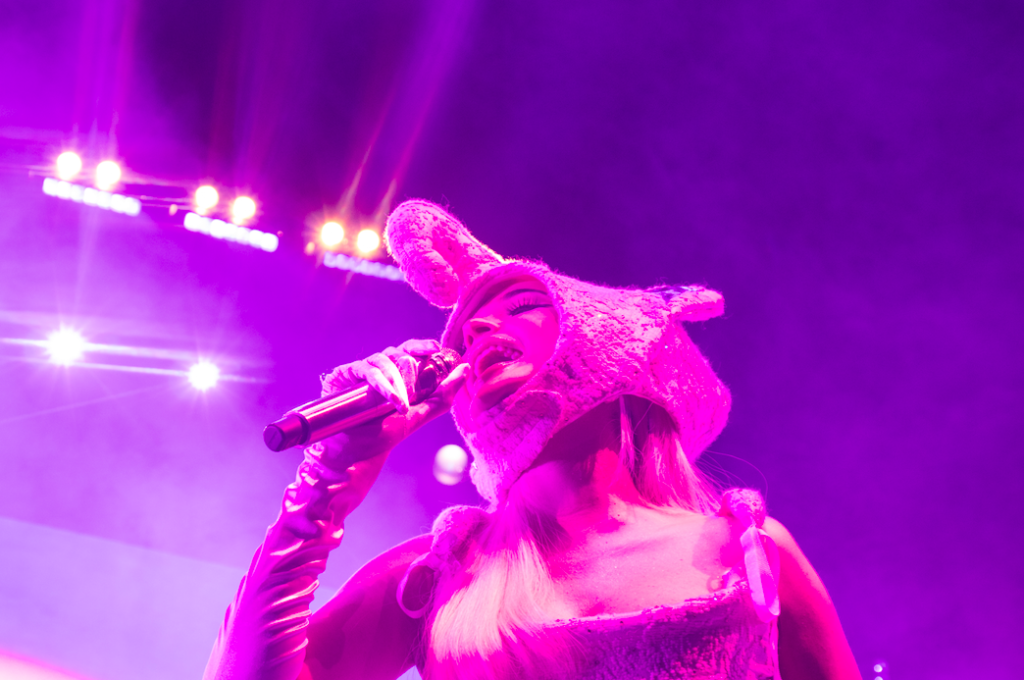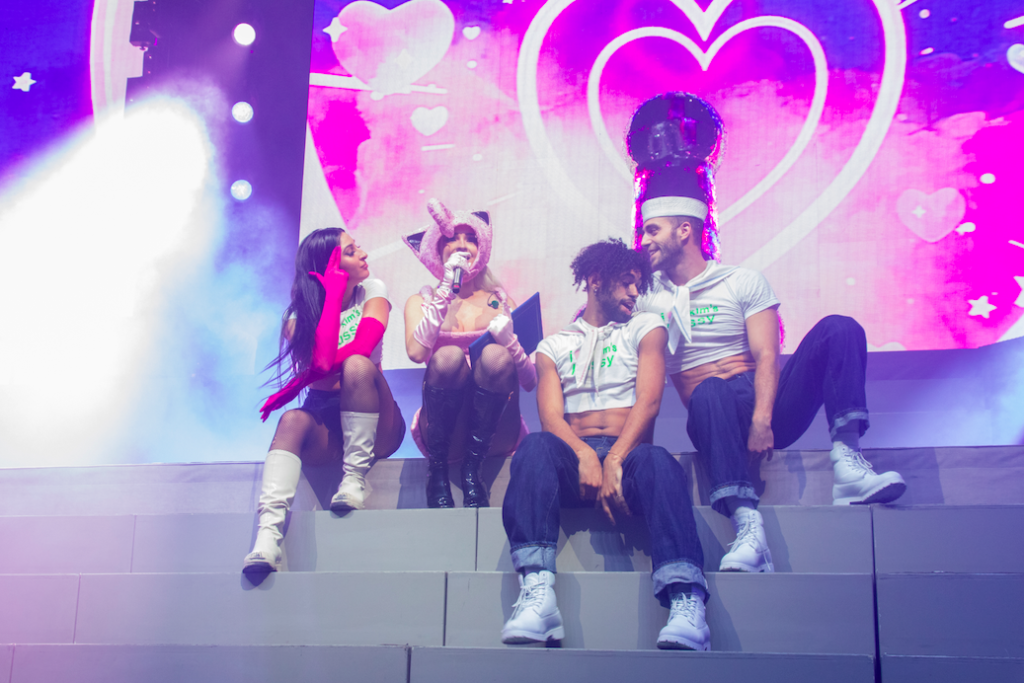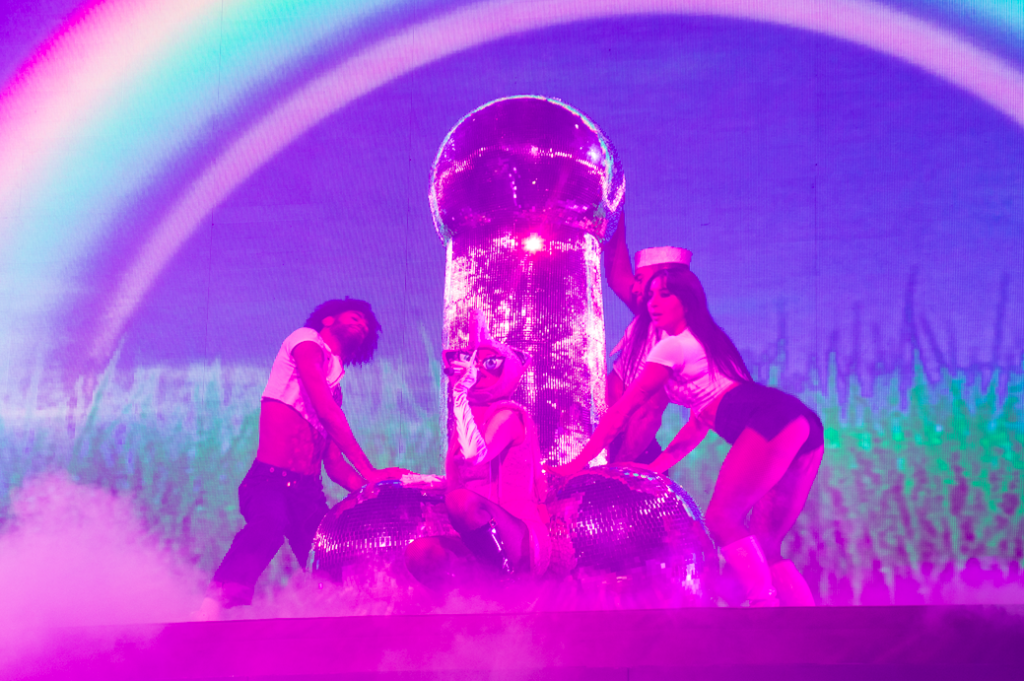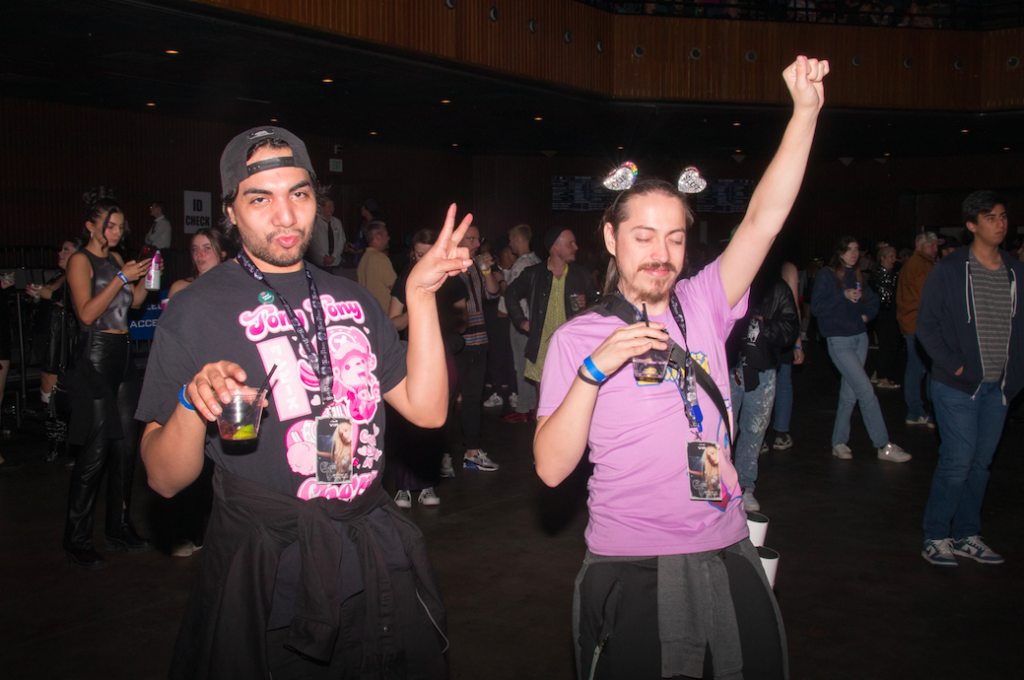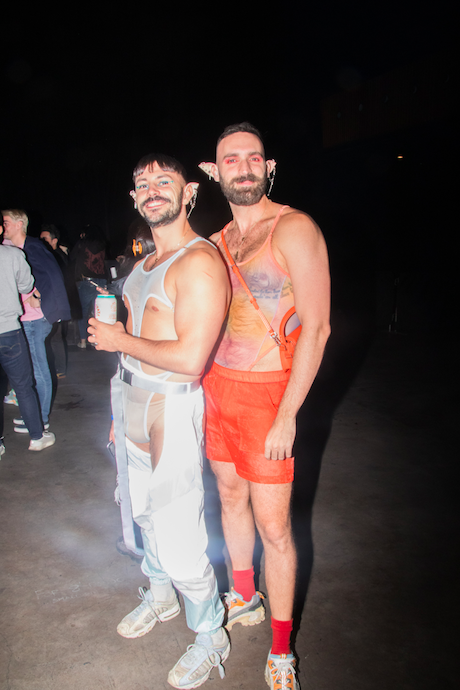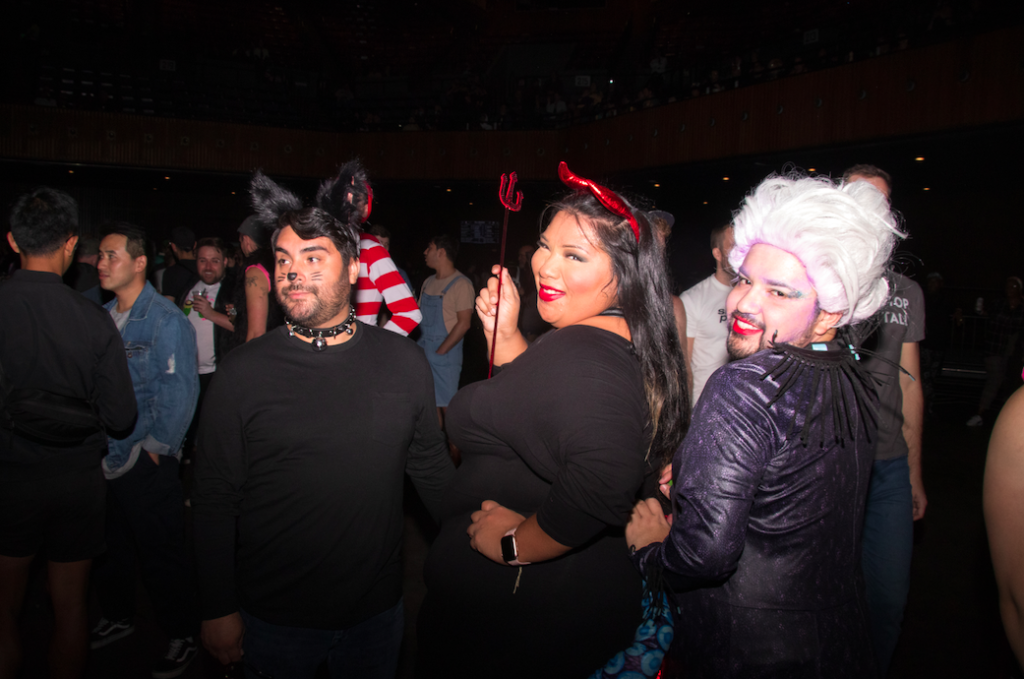Kim Petras still looks astonished to find herself on stage. The German singer throws herself into the role of pop star, treating it as an opportunity to indulge her wildest onstage fantasies. She emerges from an iron maiden, staging contests of sexual willpower between herself and her dancers on a revolving stage, disappears backstage in a tuxedo, and emerges in a shimmering silver dress. Nineteen stops into her Feed the Beast tour at the Bill Graham Civic Auditorium in San Francisco, she seemed just as elated as if the night’s gig were her big break. When she and her massive stage crew take a bow at the end and the cheers well up from her devoted audience of mostly gay men, the flabbergasted look of gratitude on her face shows no sign of being disingenuous—though maybe a flabbergasted look of gratitude is something you have to learn in showbiz.
Yet a streak of hostility and defensiveness bubbles just under the surface of her music, and it’s evident not only in her two albums from this year—June’s Feed The Beast and September’s Problématique—but in her stagecraft. The Christian right went crazy when Petras and Sam Smith performed their hit “Unholy” amid lurid Luciferian imagery at this year’s Grammys, but anyone who comes out of a Petras performance convinced that the singer is encouraging her audience to dance with the devil (as she literally did while performing “Unholy”) lacks basic skills in art analysis. I believe the Satanic imagery serves two functions: first, to poke fun at evangelical moral panic about the LGBTQ+ community and second, to reflect the compromises Petras has made to become a pop star.
A major figure in Petras’s development as an artist is Dr. Luke, the hitmaker who was instrumental in the careers of stars like Kelly Clarkson, Katy Perry, and Kesha. The latter accused him of emotional and sexual abuse in 2014. I have no idea how much Petras knows about the truth behind these allegations, but she’s remained unapologetic about working closely with the producer while hedging her defenses by suggesting her positive experience with Luke “does not negate or dismiss the experiences of others or suggest that multiple perspectives cannot exist at once.” One imagines Petras spending a lot of time rehearsing arguments in her head against commentators in the press and on the Internet who question her decision to work with an alleged abuser, no matter how much her PR advises her to steer clear of the subject.
Petras’ stance on the Dr. Luke controversy, which is pretty clearly apathetic and disinterested, is most clearly expressed in the way she presents her work. Problématique literally opens with mock dialogue amid the chattering atmosphere of a club: “Isn’t she, like, problematic?” asks one partygoer. “No, she’s problématique,” says the other. The record was supposed to be Petras’s debut. Ironically, Luke was most likely responsible for the continued delays that kept it shelved, and when it leaked in 2022, a despondent Petras tweeted, “I just wanna quit.” Encouraged by management to “feed the beast” with new music, Petras turned Feed The Beast into the title and concept of her next album and created an entire deal-with-the-devil narrative around it, which she re-enacts on stage.
At the Bill Graham, the tension was palpable between Petras’s passive-aggressive potshots at the music industry and her gleeful habitation of an arch-diva persona, psychically embracing her gay fans from the stage like Eva Perón from the balcony. Nearly all of the choreography across Petras’s 31-song set involved her being chased and courted by some hostile and sexually aggressive entity—a devil, a trio of worshipful cultists, a band of rapacious leather freaks—which Petras initially keeps at bay with a half-hearted push, but to whom she eventually surrenders in a full-bodied embrace. Her visuals are some of the most impressive and imaginative I’ve seen from a pop singer, but they betray an almost aggressive desire to shock, not just with imagery of impaled bodies and corpses swinging from chains but with analog-horror jumpscares bolstered by earsplitting sound.
There’s something creepy going on here: a singer who seems to be having fun and yet who lashes out through her music. What this means for her well-being is not immediately apparent at the moment: she’s funny and upbeat in interviews, though she leans towards fashion choices that make her look like she’s been through hell and back.
What it does for her music and aesthetics, though, is invaluable. This is a pop star with a real edge, one of a few artists playing American arenas whose work feels genuinely transgressive and dangerous. Small wonder that, like fellow problématique pop fave Grimes, she leans towards Viking and medieval imagery rife with chain-mail and swords. Even at its dumbest, her music flashes with a steely intellect. Perhaps her definitive release is 2021’s SlutPop, a seven-track EP of almost cartoonishly graphic sexuality, which got panned by critics on release but whose sensibilities towards the extreme I found refreshing in a middle-of-the-road pop landscape in which songs seem written to sound as unobtrusive in a coffeeshop as possible. She played it in its entirety at the Bill Graham, humping her backup dancers with vigor. Anyone can feel sexy, shouting back along at these lyrics about wanting to fuck and be treated like a little slut.
I’ve heard critics complain that the vulgar-auteur gnarliness of her aesthetics isn’t matched in her pop songs, but I think this criticism is beside the point, just like complaining that KISS doesn’t sound enough like Motörhead. There’s something delightful-cheesy-campy-extreme about artists whose music doesn’t quite match the ghoulishness of their aesthetics, when the monster makeup doesn’t wholly disguise the kid beneath. Watching Petras’s black-robed fanatics vogue to the peppy Euro strains of “Feed The Beast,” I was reminded a bit of the Swedish band Ghost, who dress as undead Catholic clergy but sound about as diabolical as Billy Idol. It perhaps goes without saying that Petras loves Halloween, and much of her set was devoted to songs from her Turn Off The Light Halloween mixtapes, including “There Will Be Blood,” which one does not need to have seen P.T. Anderson’s oil-and-greed epic of the same name to enjoy.
No less interesting than the spectacle onstage was the crowd of homosexuals, most of whom had elected for Halloween-lite costumes, i.e. costumes you can still dance, drink, and grind on your partner while wearing. Though Petras is a trans woman, the crowd seemed composed largely of cisgender men, most but not all white, some alarmingly young. Two thoughts immediately came to mind, the first being that the gay teenagers of Gen Z are much more stylish and less furtive than the ones I encountered at LGBT events in high school, though perhaps I was just going to the wrong ones. The second: where do they all come from? Even in the Castro on a Friday I have rarely seen such a density and plurality of confident, self-assured, well-coiffed young gays. I imagine they must all have day jobs, as the writhing was not quite as extreme as it might’ve been on a weekend night when one could afford to pop a molly and stay awake.
Opening the night was a set from Alex Chapman, a loose-limbed DJ in mime garb whose job was to make every 21-year-old gay in the audience go absolutely buck. His set was like a greatest-hits of contemporary gay anthems from “Dancing On My Own” to “Gimme Gimme Gimme (A Man After Midnight).” He even threw in Fall Out Boy’s “Sugar We’re Goin’ Down” for the “emo bitches” in the crowd, reminding me that the excesses of the alt-rock era at least produced some of the weirdest lyrics ever guaranteed to get an entire stadium singing along. Though an AI could have generated an equally potent set of sounds everyone in the crowd would know, an AI wouldn’t have sowed the idea in the heads of at least half the audience that they might be able to bring it home at the end of the night.
Petras’ marathon set ended with Victor Ruiz-Cornejo from London Breed’s office declaring October 29 “Kim Petras Day” in San Francisco, following which Petras disappeared into the same stage elevator from which she emerged. The artist has a little rallying call, an avian “WHOOP-ah,” that she occasionally uses in her songs as a sort of producer tag. The first time she let it loose, it felt like a spontaneous ad-lib. The second time, as she encouraged the audience to whoop back at her, it felt like a catchphrase. The third time, it was the last sound we heard from Petras as she disappeared below the stage. The image that lingered in my head afterwards was that of a bird in a cage.


